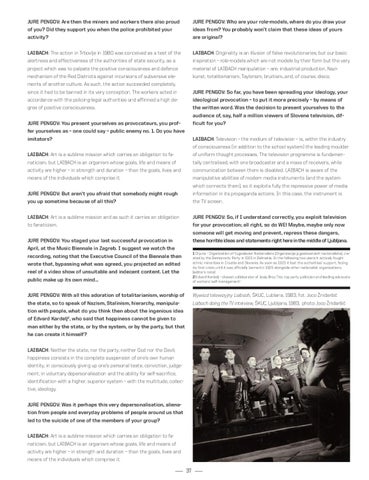JURE PENGOV: Are then the miners and workers there also proud of you? Did they support you when the police prohibited your activity?
JURE PENGOV: Who are your role-models, where do you draw your ideas from? You probably won’t claim that these ideas of yours are original?
LAIBACH: The action in Trbovlje in 1980 was conceived as a test of the alertness and effectiveness of the authorities of state security, as a project which was to palpate the positive consciousness and defence mechanism of the Red Districts against incursions of subversive elements of another culture. As such, the action succeeded completely, since it had to be banned in its very conception. The workers acted in accordance with the policing-legal authorities and affirmed a high degree of positive consciousness.
LAIBACH: Originality is an illusion of false revolutionaries, but our basic inspiration – role-models which are not models by their form but the very material of LAIBACH manipulation – are: industrial production, Nazikunst, totalitarianism, Taylorism, bruitism…and, of course, disco. JURE PENGOV: So far, you have been spreading your ideology, your ideological provocation – to put it more precisely – by means of the written word. Was the decision to present yourselves to the audience of, say, half a million viewers of Slovene television, difficult for you?
JURE PENGOV: You present yourselves as provocateurs, you proffer yourselves as – one could say – public enemy no. 1. Do you have imitators?
LAIBACH: Television – the medium of television – is, within the industry of consciousness (in addition to the school system) the leading moulder of uniform thought processes. The television programme is fundamentally centralised, with one broadcaster and a mass of receivers, while communication between them is disabled. LAIBACH is aware of the manipulative abilities of modern media instruments (and the system which connects them), so it exploits fully the repressive power of media information in its propaganda actions. In this case, the instrument is the TV screen.
LAIBACH: Art is a sublime mission which carries an obligation to fanaticism, but LAIBACH is an organism whose goals, life and means of activity are higher – in strength and duration – than the goals, lives and means of the individuals which comprise it. JURE PENGOV: But aren’t you afraid that somebody might rough you up sometime because of all this? LAIBACH: Art is a sublime mission and as such it carries an obligation to fanaticism.
JURE PENGOV: So, if I understand correctly, you exploit television for your provocation; all right, so do WE! Maybe, maybe only now someone will get moving and prevent, repress these dangers, these horrible ideas and statements right here in the middle of Ljubljana.
JURE PENGOV: You staged your last successful provocation in April, at the Music Biennale in Zagreb. I suggest we watch the recording, noting that the Executive Council of the Biennale then wrote that, bypassing what was agreed, you projected an edited reel of a video show of unsuitable and indecent content. Let the public make up its own mind…
1 Orjuna – Organization of Yugoslavian Nationalists [Organizacija jugoslovenskih nacionalista], created by the Democratic Party in 1921 in Dalmatia. In the following two years it actively fought ethnic minorities in Croatia and Slovenia. As soon as 1923 it lost the authorities’ support, facing its first crisis until it was officially banned in 1929 alongside other nationalist organisations. [editor’s note] 2 Edvard Kardelj – closest collaborator of Josip Broz Tito, top party politician and leading advocate of workers ‘self-management’.
JURE PENGOV: With all this adoration of totalitarianism, worship of the state, so to speak of Nazism, Stalinism, hierarchy, manipulation with people, what do you think then about the ingenious idea
Wywiad telewizyjny Laibach, ŠKUC, Lublana, 1983, fot. Joco Žnidaršič Laibach doing the TV interview, ŠKUC, Ljubljana, 1983, photo: Joco Žnidaršič
of Edvard Kardelj2, who said that happiness cannot be given to man either by the state, or by the system, or by the party, but that he can create it himself? LAIBACH: Neither the state, nor the party, neither God nor the Devil; happiness consists in the complete suspension of one’s own human identity, in consciously giving up one’s personal taste, conviction, judgement, in voluntary depersonalisation and the ability for self-sacrifice, identification with a higher, superior system – with the multitude, collective, ideology. JURE PENGOV: Was it perhaps this very depersonalisation, alienation from people and everyday problems of people around us that led to the suicide of one of the members of your group? LAIBACH: Art is a sublime mission which carries an obligation to fanaticism, but LAIBACH is an organism whose goals, life and means of activity are higher – in strength and duration – than the goals, lives and means of the individuals which comprise it.
37
